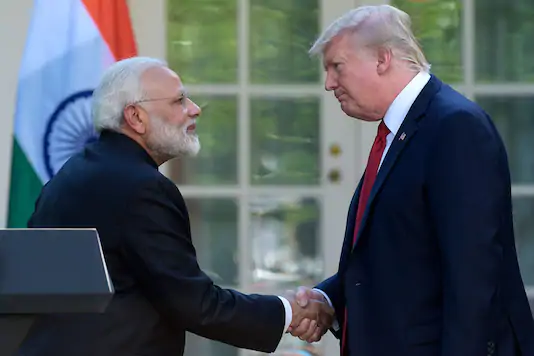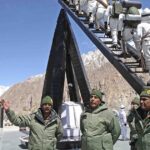
SOURCE: NEWS18
China is quite literally working rings around India. In the aftermath of the hostile border standoffs and the deaths of Indian soldiers in Ladakh, India has suffered another major strategic setback. According to various reports, Iran has announced that it is going to drop India’s involvement in the Chabahar Port development project.
This comes on the heels of a 25-year Sino-Iranian agreement, according to which, China will invest more than $400 billion dollars in Iran. The Chinese have also announced closer military and strategic ties with Iran. Cash poor, oil and gas rich Iran stands to benefit from these new investments as it struggles to gain control over an economy that is permanently crippled by harsh economic sanctions.
In 2016, India entered into an agreement to develop Chabahar Port, which Prime Minister Narendra Modi claimed would be an engine of growth for both countries. A $250 million dollar commitment was made to develop the port and $400 million was pledged to lay a railway line between Chabahar and the North Eastern city of Zahedan. A few days ago, Iran announced its intentions to lay the 628 km railway line itself because it claimed India had fallen behind on payments and reneged on its commitments. Of course, Iran has acted in what it deems to be in its national interest and has calculated that the fallout of dropping India will be negligible.
Importantly, one of the few Iranian ‘entities’ that has not been sanctioned by the United States was Chabahar Port in the South Eastern province of Sistan-Balochistan. One of the reasons for this was that the US wanted the port to be used to rebuild war-torn Afghanistan. The Afghans, on the other hand, would have a safe route of passage to the Indian Ocean and one that would avoid the China backed port of Gwadar in Pakistan.
For Indians the Chabahar Port is of vital strategic importance because it bypasses Gwadar but at the same time also gives India direct access to the markets of Afghanistan, Turkmenistan, other Central Asian countries. In fact, overland access to European markets, as per the Ashqabad Agreement, through the International North-South Transport corridor have the potential to save India almost 50% on freight cost as well as transportation times. Additionally, this corridor is also of strategic relevance to India as it runs counter to China’s Belt and Road Initiative, of which Iran is a member.
Quite apart from the economic benefits, India also stands to lose ground geo-strategically. If Iran decides to drop any further Indian involvement in Chabahar then the Chinese will push for the integration of the port with Gwadar. This, in turn, will increase its strategic and security footprint in the region and will also help Pakistan.
It has been evident for some time that Iran has been willing to play the diplomatic hardball. Last year Iran publically criticised the BJP government for the revocation of Article 370 and its Kashmir policy, and this year Ayatollah Khamenei appealed to the government to stop ‘extremist Hindus’ from perpetrating anti-Muslim violence. It seems Iran has calculated that there will be no blowback for these remarks whereas it has had no trouble signing this new agreement with Beijing despite the Chinese government’s barbaric and inhuman treatment of Muslim Uyghurs in South-West Xinjiang. Moreover, Iran dropped an Indian consortium led by ONGC Videsh in January 2020 from developing the Farzad-B gas fields and has contracted another operator. India’s investment in Farzad-B had become inactive due to its fear of sanctions from the US. Herein lies the rub.
It is increasingly clear that India has pushed itself into a strategic bind by leaning and relying on US support even in its dealing with its neighbours. A number of analysts have pointed to the increasing geo-strategic importance of Eurasia and it is not a coincidence that that is exactly where China has begun to tighten its noose. This over-reliance on the US is borne out by the fact that India’s inclusion in the 2017 coalition known as the QUAD (the other members are Japan, Australia and the US) only gives India strategic depth in the Indo-Pacific region. This, in turn, does little to contain the noose that China is trying to place around India in the North, which is exactly where its strategic vulnerabilities lie.
On the other hand, India has not leveraged its membership of the 2001 Shanghai Cooperation Council which was created through China’s initiative. The other members of the SCO are Russia, Kazakhstan, Uzbekistan, Kyrgyzstan, Pakistan and Tajikistan. Additionally, the US is threatening to use sanctions to drive a wedge between India and another important regional ally, Russia. The US has openly threatened to punish India under the CAATSA laws for buying Russian military hardware. This arm twisting by the US was what made India compromise on its independent religional policy vis-à-vis Iran in the first place. In 2005 India voted against Iran in the International Atomic Energy Agency vote in exchange for the ratification of the Indo-US nuclear deal.
Iran already has a close working political and military relationship with Russia apart from also being part of China’s Belt and Road initiative and also signing various bi-lateral agreements with Pakistan. The highly visible personal outreach and diplomacy by Modi does not seem to be delivering any concrete strategic results for India. Additionally, the much publicised closeness with the US and Israel, which also leans on the apparent personal relationships between Modi, Donald Trump and Benjamin Netanyahu, has also led to skepticism in Iran about the previous impartiality that it viewed India with. It seems that the BJP government is relying on a Trump re-relection as part of its foreign policy strategy, which in itself does not bode well in case a Democrat is elected.
Furthermore, India needs to fast regain the confidence of many of its neighbours and regional allies if it is to secure its position in Eurasia and not simply become an extension for US foreign policy in the region. Iran is a vital strategic ally and Indian national interests should not suffer due to a government in New Delhi that is increasingly being perceived as partisan and on the back foot. The BJP needs to rethink and redefine India’s strategic interests beyond ideological interests and conceive of a coherent foreign policy strategy that is neither contingent on PR driven marketing, aimed at consolidating domestic political power nor on the individual likes and dislikes of politicians.






